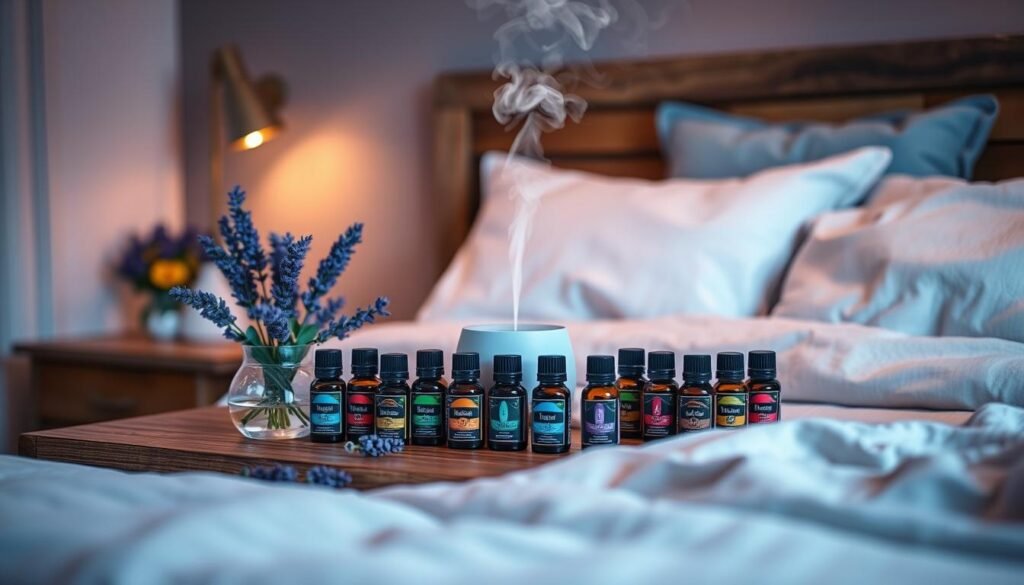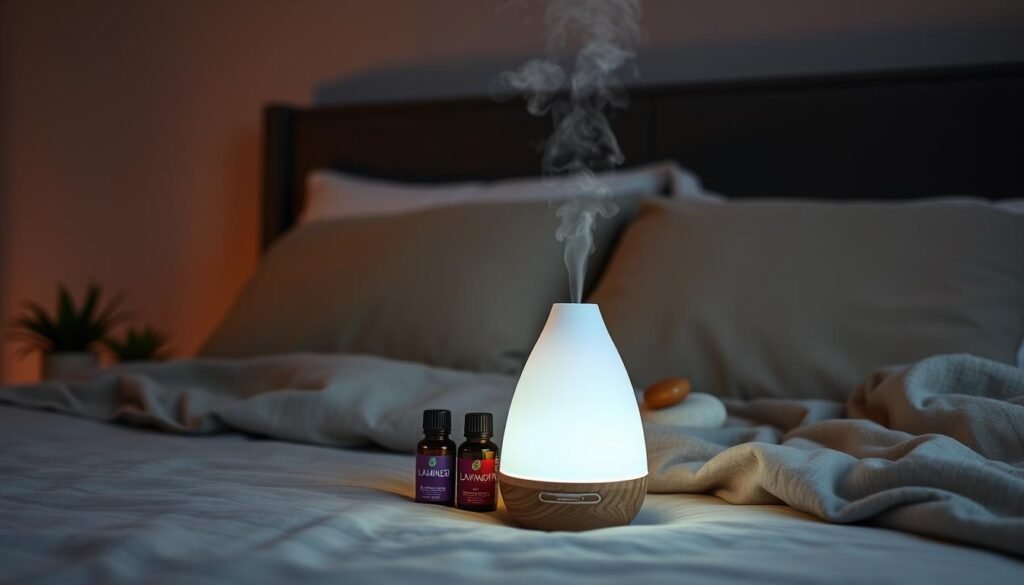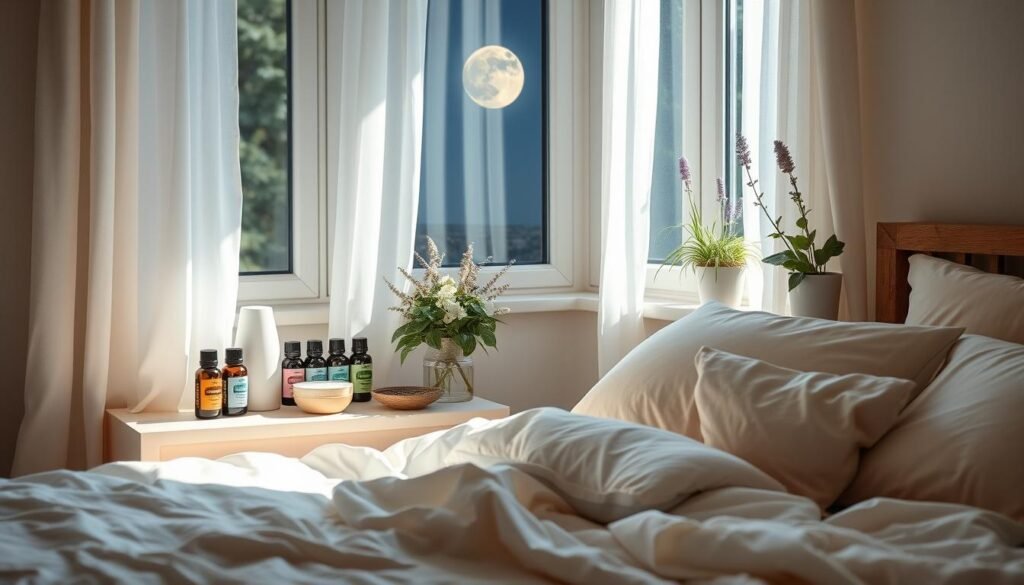Did you know that about 30% of adults struggle with insomnia or sleep problems at some point? This fact highlights a big need for good sleep solutions. Aromatherapy for insomnia offers a natural way to relax, using essential oils to improve sleep. In this guide, we’ll explore how certain essential oils can help you relax and sleep better, turning bedtime into a peaceful time.
Key Takeaways
- Aromatherapy can significantly improve relaxation and deepen sleep.
- Essential oils are most effective when diluted to a safe concentration for topical use.
- Lavender is the leading essential oil used for sleep support, backed by multiple studies.
- Aromatherapy can also aid mood elevation and stress relief.
- Expert guidance is essential when using essential oils, as adverse effects may occur.
Understanding Insomnia and Its Causes
Insomnia is a common sleep issue. It makes it hard to fall asleep or stay asleep. About 30-40% of adults experience insomnia symptoms. Around 10-15% suffer from chronic insomnia. This means sleep troubles occur three times a week for more than three months. This can harm health, leading to high blood pressure and Alzheimer’s.
Many factors cause insomnia. Stress, anxiety, and depression often trigger it. Irregular sleep patterns and too much screen time also contribute. Health issues like diabetes and chronic pain increase insomnia risk. Older people and menopausal women are more likely to have sleep problems.
A family history of insomnia can mean a higher risk of having it. Insomnia is linked to mood disorders, with 40-60% of insomnia patients showing depression signs. Cognitive Behavioral Therapy for Insomnia (CBT-I) helps treat chronic insomnia. However, the effectiveness of dietary supplements and natural sleep aids is still uncertain.
| Risk Factors for Insomnia | Impact on Insomnia |
|---|---|
| Gender (more common in women) | Higher prevalence rates |
| Older age | Increased susceptibility |
| Lower socioeconomic status | Higher stress levels |
| Chronic medical conditions | Heightened difficulty |
| Increased risk |
Insomnia is complex, so diagnosis and treatment must be personalized. Combining lifestyle changes with professional advice is key. This approach can significantly ease insomnia symptoms.
How Aromatherapy Works for Sleep
Aromatherapy uses essential oils from plants for healing. These oils are breathed in or put on the skin to enjoy their aromatherapy benefits. Their scents strongly affect emotions and memory through the limbic system.
Research highlights specific sleep-inducing aromas such as lavender and chamomile. They teach the brain to link these smells with calmness and sleep. Lavender oil, in particular, is known for enhancing sleep quality, making it a top choice for essential oils for relaxation.
Aromatherapy does more than help sleep. Some scents can lessen anxiety and depression, boosting mental health. For example, citrus smells have been found to lift moods, cutting down on antidepressant use.
There are many ways to use these oils for sleep. Techniques include oil diffusers, room sprays, or facial steamers. Oils like sweet marjoram and valerian create a peaceful environment. They turn bedtime into a calming, relaxing ritual.
Aromatherapy for Insomnia: The Science Behind It
In recent years, aromatherapy has gained attention for helping with sleep issues. Studies show that certain essential oils improve sleep by promoting relaxation. Lavender and chamomile, in particular, show promise for those with sleep disorders.
A study highlighted by aromatherapy research shows sleep disorders vary widely around the globe. They can affect from 1.6% to 56.0% of people. In research with 105 cardiac patients, they were divided into three groups. These groups tried lavender and peppermint oils to see how they affected sleep. This was the first time peppermint was tested for sleep among heart patients.
Research suggests aromatherapy can be a good alternative to drugs for sleep problems. People often prefer it to avoid the risk of dependency. The review looked at 15 journals. It included studies from 12 Randomized Controlled Trials. This highlights how important aromatherapy can be for tackling insomnia.
The science behind aromatherapy and sleep keeps getting clearer. Better sleep from aromatherapy can lead to improved overall health. This proves the important role essential oils play in getting good sleep.
Best Essential Oils for Sleep
Searching for the best essential oils for sleep can greatly enhance sleep quality. Many turn to aromatherapy for a natural way to fight insomnia. They find calming scents that help with relaxation and peaceful sleep. Lavender essential oil is especially known for its incredible calming properties.
Lavender: The Most Popular Sleep Aid
Lavender oil is famed for shortening the time it takes to fall asleep. It also improves the quality of deep sleep. Studies show it can reduce anxiety, heart rate, and blood pressure. This creates an ideal sleeping environment. Adding lavender to a bedtime routine helps many feel more relaxed, making it a top sleep aid.
Other Effective Essential Oils
Other oils work well with lavender to enhance relaxation and sleep. Here are a few:
- Roman Chamomile: Mixed with lavender, it lessens anxiety and betters sleep.
- Jasmine Oil: This oil can be more soothing than some sleep medications.
- Indian and Australian Sandalwood: These promote calmness and reduce stress.
- Valerian Root: It’s noted for its sleep-promoting properties, especially as tea.
- Cedarwood Oil: Known for its soothing impact, it helps extend sleep time.
- Vetiver Oil: This oil eases anxiety, adding to a calming sleep setup.
- Ylang Ylang, Bergamot, and Marjoram: These are known to decrease stress and aid in better sleep.
Trying different essential oils may help you find the perfect blend that fits your needs. It can make your sleeping space more calming. Finding the right scents can take some time, but it ensures that each person finds what helps them the most.

Methods to Use Aromatherapy for Better Sleep
Aromatherapy offers methods to make sleep better and relaxation easier. Using aromatherapy can help those with sleeping problems. Here are some good ways to use essential oils at night.
Essential Oil Diffusers
Essential oil diffusers make the air calm. They spread oils like lavender and chamomile in the room, helping you sleep better. Studies show these scents lower anxiety and help you relax, making falling asleep easier.
Topical Application Techniques
Topical application means rubbing oils on places like wrists or neck. This method lets you breathe in the calm scents and absorbs into your skin. It works faster to help relax before bed.
Aromatic Baths and Compresses
Aromatic baths add another way to use essential oils at night. Just a few oil drops in your bath can relax muscles and calm you. Or, hot towel compresses with oils can relax specific areas, making sleep better.
These aromatherapy methods not only make sleep better but also create a peaceful bedtime routine. To learn more about aromatherapy for sleep, check out this resource.
Creating Relaxation Techniques with Aromatherapy
Fighting insomnia often means creating a calm bedtime routine. Using aromatherapy for relaxation can help signal to your body that it’s time to rest. Pairing calming scents with activities like reading, meditation, or gentle yoga can set the perfect sleep environment.
Essential oils play a key role here. For example, lavender is known for its soothing effect. Aromatherapy can improve sleep quality by reducing stress, anxiety, and tiredness. Adding oils like chamomile or bergamot increases these benefits.
For a better experience, try visualization. Picture serene scenes or listen to soft nature sounds while using essential oils. This creates a powerful, relaxing atmosphere. Adding these practices makes the most of aromatherapy’s soothing powers, linking mind and body more deeply.

| Essential Oil | Properties | Suitable For |
|---|---|---|
| Lavender | Calming and soothing | Promoting sleep |
| Chamomile | Gentle and sedative | Inducing restful sleep |
| Bergamot | Reduces anxiety and stress | Relaxation techniques |
| Ylang-Ylang | Fosters tranquility | Enhancing mood and peace |
Making Aromatherapy Blends for Insomnia
Personalized aromatherapy blends can provide a tailored sleep experience. Using essential oils like lavender, chamomile, bergamot, and cedarwood allows for the creation of unique aromatherapy blends for insomnia. These blends help with various sleep challenges by promoting relaxation and a peaceful sleep atmosphere.
When making DIY essential oil blends, use 2 to 5 drops of each essential oil. Blend them to get the effect you want. Mixing the oils with a carrier oil, like coconut or almond oil, makes them safe for skin. Use a mix of 1 teaspoon of carrier oil for each drop of essential oil to keep your skin safe while relaxing you.
Trying different combinations is important to find the best blend. For better sleep, add 2-3 drops of lavender to a diffuser 30 minutes to 1 hour before bed. Or, for a relaxing bath, mix the oils into bathwater. This helps create a calm environment that’s perfect for winding down.
| Essential Oil | Function | Recommended Usage |
|---|---|---|
| Lavender | Promotes relaxation and reduces anxiety | 2-5 drops in diffuser or pillowcase |
| Chamomile | Helps calm the mind | 2-5 drops in carrier oil for topical application |
| Bergamot | Alleviates stress and enhances mood | 2-3 drops in an aromatic bath |
| Cedarwood | Stabilizes emotions and promotes restfulness | 2-3 drops in a roller bottle |
Adding a aromatherapy blends for insomnia routine at night can really improve your sleep. Doing simple things like smelling these blends or putting them on your skin can create a calm place for you to sleep well. If you want something ready to use, check out VOS’s Sleep Tight aromatherapy roller. It’s a great option for those looking for a prepared blend.
Complementary Natural Sleep Remedies
Natural sleep remedies improve your sleep. Herbal aids and other solutions are popular for beating insomnia. Using them can make your sleep better.
Using Herbal Sleep Aids
Herbal aids like valerian root, chamomile, and ashwagandha help with sleep troubles. Valerian root can help you sleep faster. But, it’s not for children or pregnant women. Chamomile is safe for most, as the FDA says, unless you’re allergic to similar plants. Ashwagandha, at 300 mg twice daily, can boost sleep quality.
Incorporating Calming Scents into Your Routine
Calming scents create a sleep-friendly environment. Essential oils, through sprays or diffusers, make the bedroom peaceful. Lavender and chamomile scents help you relax. Adding these scents to your bedtime routine is a great idea. They help your mind and body relax for better sleep.

Precautions When Using Essential Oils
Essential oils have amazing benefits. But, it’s crucial to use them safely. Proper precautions help avoid bad reactions. Always dilute essential oils with a carrier oil before applying them to your skin. A dilution ratio from 1% to 5% reduces risks of irritation or allergic reactions. For example, a 1% dilution means mixing six drops of essential oil with one ounce of carrier oil.
Choosing high-quality essential oils is important. Since the FDA doesn’t regulate these products, go for trusted brands. Don’t use essential oils that are more than three years old. Over time, they can spoil due to oxygen exposure, which might lead to irritation or less effectiveness.
Be mindful of who is using essential oils. Kids under six should avoid oils like birch and wintergreen because of their toxic ingredients. Oils such as eucalyptus and peppermint need caution around infants. Their skin is thinner, making them more sensitive to these oils.
- Pregnant women should steer clear of certain oils like wormwood and rue, which might harm the unborn baby.
- When applying oils topically or using a diffuser, make sure the oils are safe for kids. Use them sparingly.
- Consider how you’re using the oils, their dilution, and how they might interact with medications or health issues.
Using essential oils responsibly is key. Before making them part of your routine, talk to a healthcare professional. This is especially important for people with health issues or for use around children or during pregnancy.
Conclusion
Aromatherapy could be the answer for those struggling with insomnia. This condition affects 10% to 20% of young and adult people. Rates are even higher among older folks. People looking for natural sleep aids might consider essential oils. Lavender and rose can improve sleep quality and create a peaceful setting. Aromatherapy’s potential in treating insomnia suggests it can be a helpful complementary therapy. It’s wise to include it in daily routines to sleep better.
Studies are diving deeper into how effective aromatherapy is for sleep problems. This practice relies on natural plant extracts. It offers lovely scents and possibly more benefits. Using essential oils safely and correctly is key. This ensures people get the most out of them. Everyone has different tastes and needs. Luckily, essential oils are versatile, letting people customize how they use them.
Turning to nature’s fragrances might boost sleep quality and life quality. People are becoming more aware of and interested in aromatherapy. Because of this, it’s becoming an essential part of holistic health. The goal is to help people sleep better in a natural way. Aromatherapy might just be the wholesome solution people are searching for.